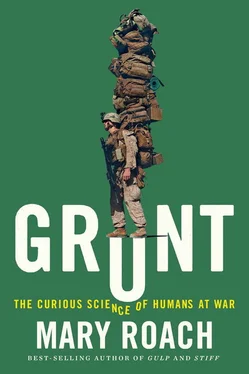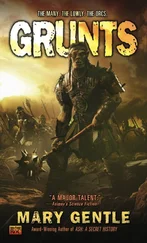Most earplugs reduce noise by 30-some decibels. This is helpful with a steady, grinding background din—a Bradley Fighting Vehicle clattering over asphalt (130 decibels), or the thrum of a Black Hawk helicopter (106 decibels). Thirty decibels is more significant than it sounds. Every 3-decibel increase in a loud noise cuts in half the amount of time one can be exposed without risking hearing damage. An unprotected human ear can spend eight hours a day exposed to 85 decibels (freeway noise, crowded restaurant) without incurring a hearing loss. At 115 decibels (chainsaw, mosh pit), safe exposure time falls to half a minute. The 187-decibel boom of an AT4 anti-tank weapon lasts a second, but even that ultrabrief exposure would, to an unprotected ear, mean a permanent downtick in hearing.
Earplugs are less helpful when the sounds they’re dampening include a human voice yelling to get down, say, or the charging handle of an opponent’s rifle. A soldier with an average hearing loss of 30 decibels may need a waiver to go back out and do his job; depending on what that job is, he may be a danger to himself and his unit. “What are we doing when we give them a pair of foam earplugs?” says Eric Fallon, who runs a training simulation for military audiologists a few times a year at Camp Pendleton. “We’re degrading their hearing to the point where, if this were a natural hearing loss, we’d be questioning whether they’re still deployable. If that’s not insanity, I don’t know what is.”
Fallon is lecturing in a classroom at the moment, but after lunch the audiologists in attendance will experience some live-fire simulated combat. Working with the Department of Defense Hearing Center of Excellence, Fallon contracted a company, ArmorCorps, who in turn brought in a team of Marine Corps Special Operations forces, and together they’ve set up a half day of warfare scenarios. The aim being to provide the hearing professionals with a firsthand feel for the frustrations and dangers of the current approach, with the hope that they’ll become advocates for something better.
Fallon turns the class over to ArmorCorps’ Craig Blasingame, a former Marine with a wide superhero jaw and muscles so big that when he walks in front of the slide projector, entire images can be viewed on his forearm. Though it’s ten in the morning, Craig has a five o’clock shadow.
“We’re going to put you in an environment today and show you what it’s like to try to maintain a degree of auditory situational awareness while you’re wearing passive hearing protection.” Craig speaks like a bullhorn. He says this is because he lost some hearing as a Marine, but I think it’s because there’s so much strength coursing around in there that everything—whiskers, voice, the pectorals under his polo shirt—wants to burst forth in a powerful way.
Craig and Aaron Iwanciw, also a former Marine and now CEO of ArmorCorps, will shortly be taking the audiologists (and myself) outside for a listening exercise. Because we’re going to the firing range afterward, this is one of the rare listening exercises that will be done in body armor and a combat helmet. Aaron is smaller and quieter than Craig, and smells pleasantly of shampoo. He helped me put on my gear. (“I can stick my lip balm and tape recorder in these little skinny vest pockets.” “Those are for ammo.”)
Outside the building, Craig arranges us in a patrol formation. In a war zone, just walking down the road has a strategy to it. The “killing radius” of a fragmentation grenade is 15 feet. If troops walked along in a clump like tourists, a single grenade could kill the lot of them. Thus they keep fifteen to forty-five feet between each other on patrols. The more spread out they are, though, the harder it is to hear one another, especially with hearing protection in place.
Aaron is the point man, while Craig takes up the rear. We’re wearing ear cuffs similar to the ones people wear when they operate power tools. Craig sounds like someone shrank him down and put him inside a mason jar. I believe I hear him tell us to “step off right.” I interpret this as meaning we’re all supposed to clear off onto the right side of the road, so I start crossing over. “You’re on the left,” barks a teammate. He sounds sure, so I turn back and narrowly avoid being hit by a black Suburban creeping along seemingly out of nowhere. When a two-ton SUV driving on gravel can sneak up on you, that’s not good.
Fallon says lapses in communication were the norm when he was in the infantry. “Do you know how much time I spent saying, ‘I have no idea what’s going on’? We’d get an order to halt, spread out, take up a more hidden position. My buddy next to me would be going, ‘What’s going on?’ And I’m going, ‘Shit, I don’t know what’s going on.’” And you couldn’t yell, ‘Hey, what’s going on?’ because the enemy would hear you and know where you were.
Aaron is leading the next exercise, a live-ammo “tactical scenario” out in the wilderness beyond the firing range. Before we head over, he has us push a button on the ear cuffs we’re wearing. This is the point in my notes where it says, “bionic!” As a kid, I used to watch a TV show called The Bionic Woman. Like her male counterpart of an earlier season, she’d been rebuilt by the military with experimental superprosthetics following some variety of hideous maiming. It was the least they could do. One of the implants was for her ear. She’d cock her head, and suddenly we’d be eavesdropping on a pair of underworld kingpins in a Buick Riviera across the street. I have her hearing now. Aaron is fifteen feet away, talking to Craig, but he sounds so close I should be smelling shampoo.
The name for what we’ve got on is TCAPS (say, tea-caps ), Tactical Communication and Protective System. Incoming noises are analyzed; the quiet ones are amplified and the loud ones reproduced more quietly. (The system also incorporates radio communications, or “comms.”) So far it’s mainly Special Operations forces who are using TCAPS. Why? Money, of course, but also the fact that it comes out of the radio budget, and the majority of foot soldiers don’t carry radios. Plus some skepticism among leadership. “Senior NCOs,” says Fallon, referring to noncommissioned officers, “will flat-out tell you, ‘Don’t give me more shit that’s supposed to be the next high-tech wonder that’s going to break or the batteries are going to go dead and I’ve got to carry it.’”
The shit we have on happens to be made by Fallon’s employer, 3M. “I hope you don’t think that that’s what this is about,” he said to me at one point. I don’t, entirely, no. Fallon is an evangelist for the product category, not the brand. 3M also supplies earplugs to the military, so either way, they’ve got a tasty piece of defense budget pie.
The hearing professionals and myself are joined for the tactical exercise by twelve men from a Marine Corps Special Operations unit, the name of which I’ve been asked to omit. Aaron briefs the lot of us.
“You are a Special Operations team heading into a village in Afghanistan,” he begins. “The mission is to make a liaison with the village elders. Engage the elders, ask about Taliban activity in the area. Ask them about their quality of life. What their problems are.” Perhaps fit them for hearing aids. “In support of the operation, we have a Predator drone in the overhead, and quick access to an assault weapons team: Cobras or Hueys. If things go kinetic we can call them up for supporting fire.” Going kinetic is military shorthand for people are firing guns at you. In this case, they’re imaginary people, but the Spec Ops guys will be shooting back anyway, because this is an exercise about communicating in the chaos and clamor of combat.
Читать дальше












